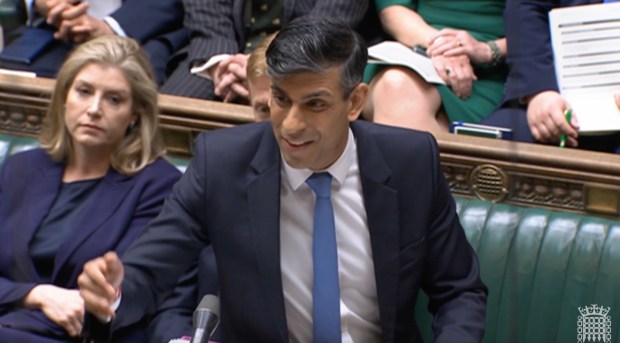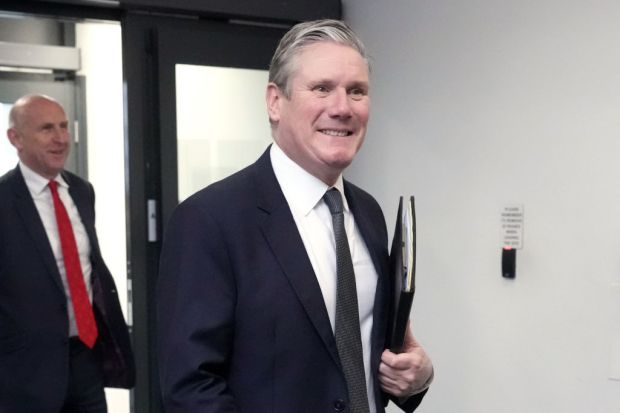Silence. That is what we heard during Gloria de Piero’s recent focus group which she held for her GB News show in her old constituency of Ashfield, one of many Red Wall seats that fell to the Conservatives in 2019. Most participants had been Labour voters up to that election but felt the party had somehow let them down and ceased to represent the working class, especially with Jeremy Corbyn as leader. De Piero found them most talkative about how Boris Johnson had once appeared to be a different kind of politician, one whose promises they had believed but who they now felt had let them down, thanks to partygate. But when the former Labour MP asked her focus group about Keir Starmer there was, for what seemed an age, silence. When she prompted them further it was clear they saw Starmer as a figure who had emerged out of nowhere and about whom they knew little, except that he was not an exceptional figure, that he was just like the rest of the Westminster political class.
Focus groups can reveal the texture of people’s thinking and this one echoed many others held during Johnson’s partygate crisis. These groups have exposed many 2019 Conservative voters’ disappointment towards, and even revulsion of, the Prime Minister. But they have also shown uncertainty about what Starmer and his party stand for. More conventional public opinion surveys confirm this impression: if the public now think very negatively about Boris Johnson as prime minister they still don’t think of Starmer in especially positive terms.
Only time will tell how successful Boris Johnson will be in drawing a line under partygate now he has won his vote of confidence. But if he is successful in addressing what he calls the ‘people’s priorities’ – and as memories of No. 10 parties fade – it will become vitally important that Keir Starmer dispels the ominous fog currently surrounding his public persona.
The beneficiary of popular dismay at Covid law-breaking in Downing Street, Starmer has after more than two years as Labour leader still failed to make a definite and positive impression on the country. By simply not being Jeremy Corbyn nor Boris Johnson, the Labour leader has helped his party achieve a sustained if hardly hegemonic poll lead since Christmas. This is of course a massive advance on Labour’s dire position at the 2019 general election. But while being the repository of protest votes against an unpopular prime minister can help a party win a few by-elections and do well in local government contests, it is no guarantee of gaining a majority in the House of Commons. Just ask Neil Kinnock and Ed Miliband. Both saw mid-term opinion polls which suggested they were on the verge of becoming prime minister: each saw that mirage suddenly evaporate when a general election came into view and voters had to make some hard choices.
What difference will Labour make to the lives of the British people, especially those who abandoned the party in 2019, remains an open question. The possible answer actually lies lost in innumerable Labour policy documents and more conference speeches than you can shake a stick at. The party does not lack things to talk about; but Starmer has yet to find a way of talking about them that makes people sit up and think. And yet, instead of trying to find a way of best communicating what Starmer’s Labour can do for the country he is apparently writing a book which few apart from the snarky commentariat will read. It is the very last thing he needs to do.
Labour’s windfall tax proposal to curtail profits in the energy industry was a sign the party can develop policies that make a tangible difference – and this is recognised by many voters. But that has now been appropriated by the government and was in any case a measure for a short-term crisis. And it was just a revamped version of a New Labour policy from 1997. That the party has yet to find another way to demonstrate how it could make a concrete difference to people’s lives suggests that the policy might have been a one-off.
Parties can win general elections with leaders who make little positive impression on the public. In the 1960s Edward Heath as leader of the opposition looked desperately dowdy and stiff in comparison to the charismatic and sassy Prime Minister Harold Wilson. But despite being dismissed by most commentators Heath managed to win the 1970 general election leaving Wilson a shocked and shattered figure.
But that was in an era when party loyalties more than leaders mattered to voters. Today parties need leaders who can communicate a clear and simple message to an electorate now barely engaged with and often hostile to politics. Boris Johnson won in 2019 repeatedly promising he would ‘Get Brexit Done’: it was a spurious and highly contested assertion, but it cut through to voters. What is Starmer’s version? On the back of the Labour leader’s most recent so-so performance at Prime Minister’s Questions the sketch writer Rob Hutton sarcastically suggested it might be ‘Settle for Starmer. You’ve Had Worse.’ Maybe something slightly more inspiring will emerge closer to an election, which is no more than two years away. But with Johnson cranking up his government machine in the hope of putting partygate behind him, the awkward silences that follow Starmer’s name should concern all Labour MPs.
Got something to add? Join the discussion and comment below.
Get 10 issues for just $10
Subscribe to The Spectator Australia today for the next 10 magazine issues, plus full online access, for just $10.




















Comments
Don't miss out
Join the conversation with other Spectator Australia readers. Subscribe to leave a comment.
SUBSCRIBEAlready a subscriber? Log in